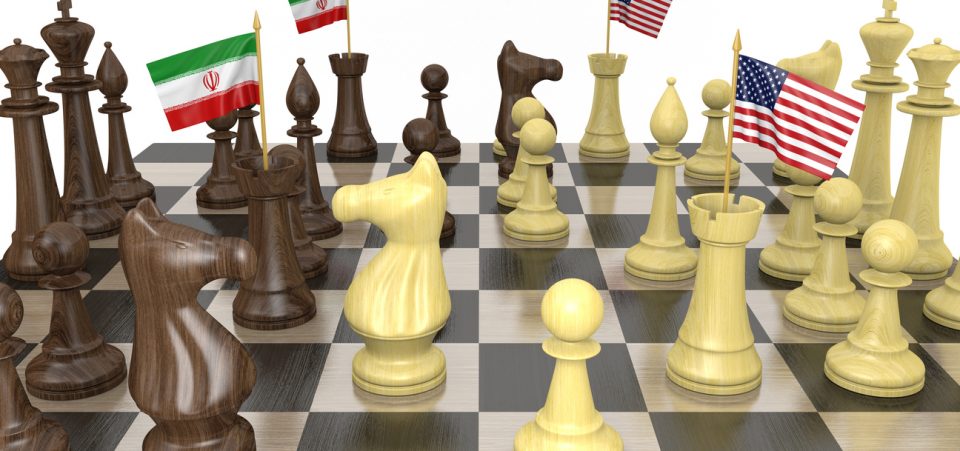Pulling Out of Iran Deal Means Recession and Loss of Credibility for U.S.
U.S. President Donald Trump has caused more damage to the United States than it has to Iran. Having unilaterally—and without cause—renounced the Iran nuclear deal, the Joint Comprehensive Plan of Action (JCPOA), Trump has set the next recession in motion.
Given the condemnation from America’s allies in Europe, Iran has already won the first battle. Trump has managed to do something that never happened along such clear lines before.
Even the United States’ Top Allies Will Retaliate
Trump has split the West. Europeans had counted on the Iran nuclear deal (the “Iran deal” for short) as one of the tools to help them emerge from the Great Recession.
Trump’s plan to interfere with one of the most significant diplomatic efforts to contain nuclear weapons development will come at a price.
Washington has gambled goodwill with its allies, who have been asked to impose sanctions against Russia—and now Iran—against their will and against their best interests.
European Countries to Move Closer to Moscow
Europe will react harshly, playing whatever version of hardball it can muster. At the bare minimum, London and Paris will join Rome, Vienna, and other European Union (EU) governments in moving closer to Moscow.
The United States can expect growing resistance from its allies against any plans it has concocted for Ukraine. Iran’s President Hassan Rouhani wasted no time in appealing to Europe and Russia, noting that the Iran deal can still proceed.
Trump has stressed that whoever continues to do business with Iran will suffer American sanctions.
With this, Trump has launched multiple “wars.” One of them involves trade and the EU, which, along with China, can make life difficult for the United States.
Expect the the big tech companies, including the so-called FANG companies—Facebook, Inc. (NASDAQ:FB), Amazon.com, Inc. (NASDAQ:AMZN), Netflix, Inc. (NASDAQ:NFLX), and Google (now Alphabet Inc (NASDAQ:GOOG))—to come under increasing fiscal scrutiny in foreign markets.
The valuations of FANG stocks do not currently account for lower earnings from having to pay higher taxes for international operations. The increased vulnerability of FANG stocks could trigger the next stock market crash—and a recession with it.
The only two countries celebrating Trump’s decision are Israel and Saudi Arabia. Russian President Vladimir Putin will keep Israel at bay while also protecting Iran. But Iran can always strike back at Saudi Arabia, blocking oil tankers in the Strait of Hormuz.
Who Can Trust the United States Now?
By withdrawing from the Iran deal, Trump has made a mockery of U.S. credibility in international affairs. As a superpower, foreign policy has always been a key instrument of U.S. economic might.
Iran’s President Rouhani immediately retorted that Tehran wants to abide by the terms of its deal with the EU, Russia, and China. But it also reserved the right to consider alternatives in case Iran’s interests suffer.
The mix of diplomacy and veiled threats should have been expected from the leader of the country that invented chess.
The result is that the U.S. and Iran are now engaged in a psychological conflict. And Iran is the better equipped of the two to win it. Rarely have such confrontations not turned into full-out war.
Honoring international treaties and commitments are key instruments of a reliable foreign policy. Trump’s decision to abandon the Iran deal does not send the right message.
It tells allies and foes alike: “Don’t trust the United States.” Whatever treaty Washington signs can be reneged with a simple signature or a single tweet.
“Brand U.S.A” Is in Tatters
The effect of these developments is to weaken the value of “Brand U.S.A.” The message it sends is one of political schizophrenia. Who will trust Trump in any major negotiation? What can North Korea’s leader Kim Jong-un hope to gain from meeting Trump?
Those in Trump’s base who have welcomed the decision should celebrate it now, while they still can. If they wait too long, they may have a recession to worry about.
Indeed, it must be conceded that Donald Trump has kept another of his electoral promises. He warned that he would trash the Iran deal that the previous resident of the White House signed (as did Russia, China, the U.K., France, and Germany) in 2015 with Iran in exchange for a partial reprieve from sanctions.
Candidates for political office make many promises; it’s a strategy. They deliver on a few of those promises and procrastinate on (or downright forget) the others. That way, they have some rabbits to pull out of their hats to please their voters.
Trashing the Iran deal was one of the promises that Trump should have dilly-dallied with. There was no rush and no need. His voters will gain nothing tangible from the decision.
They will, however, get a chance to experience another major recession. They have already been enjoying much higher gas prices.
Oil Prices Will Affect Ordinary Americans and U.S. Allies Alike
In Pennsylvania, one of Trump’s key state wins in 2016, a gallon of gasoline already costs over $3.00 a gallon.
Some shale producers might be happy in Texas, but the oil industry employs far fewer Americans than does the solar industry. (Source: “US solar power employs more people than oil, coal and gas combined, report shows,” The Independent, January 23, 2017.)
Even if the rising oil price starts to cause problems for most Americans, the United States will have little to worry about in terms of oil supply. At $70.00–$80.00 per barrel (where oil is headed), U.S. shale producers will have sufficient incentives to produce.
As for Europe, China, Japan, India, and many parts of the developing world, securing oil supplies will be a bigger problem with an isolated Iran.
Removing the diplomatic niceties, Trump has angered most of the world with his decision to withdraw from the Iran deal.
Few would be so dumb as to attempt a military response. But that doesn’t mean they won’t find ways to deliver a message to express their annoyance with Washington. It’s a tool that, if used strategically, could cause a recession at best and the U.S. economy to collapse at worst.
It’s called the U.S. dollar—or better, the petrodollar.
The Impact on the Dollar and the Economy
The U.S. dollar, or the way it functions in the global economy, plays a central role in ensuring America’s economic might. Nonetheless, that might not emerge from—or operate in—isolation.
It relies on an intricate geopolitical system based on energy—oil, in particular. A breach of this system will send the U.S. economy into a tailspin.
The U.S. dollar has become the currency of choice for oil producers. Saudi Arabia and Organization of the Petroleum Exporting Countries (OPEC) countries sell oil in—and only accept—U.S. dollars. Global oil demand, therefore, equates to global demand for dollars.
The Saudis then invest the U.S. currency through the American financial system. In return, the Saudis enjoy U.S. military protection.
That was by and large the arrangement that Franklin Delano Roosevelt made with King Abdulaziz on February 14, 1945, right after the Yalta Conference that sealed the fate of post-World War II Europe.
The argument can be made that the system that created the petrodollar was responsible for the decline of the value of gold. Therefore, the end of the petrodollar could prompt the re-emergence of gold. But that’s a topic for another article.
The United States, unlike other countries, can print more money at will, because its currency is always in demand.
The Role of the Dollar and U.S. Military/Political Power
It’s the U.S. dollar and the military/political power it represents that allows the United States to run up a massive national debt (now more than $21.1 trillion), selling Treasuries (or debt) to other countries.
The petrodollar (and the massive liquidity advantage it gives to the U.S.) has also allowed for the rise of the financial engineering field, populated by options and derivatives on Wall Street.
Therefore, U.S. military hegemony—the ability to function with debts that would have killed other countries long ago—and the fortunes of the financial sector on Wall Street both rely on the dollar and U.S. political/military power.
Dismantling the Iran Deal Will Backfire in Asia
Japan and China are key holders of U.S. debt. They happen to be major oil importers, and from Iran at that.
Cold War or not, Washington has never stopped dreaming of exercising global hegemony. That’s why the U.S. establishment fears Russian or Chinese protagonism.
Imagine then, how Washington will endure the emerging economic, military, and political alliance between China, Russia, and Iran.
These three countries have increasingly signaled their intention to drop the petrodollar. Russia has accepted payments in gold bullion from China in exchange for its oil.
Isolating Iran, China’s chief oil supplier and a key Russian ally in preserving the sovereignty of Syria, has created the conditions for ditching the dollar. Similarly, the delegitimization of Washington’s diplomacy will eventually leave it isolated in the Korean peninsula and the rest of Asia.
More than Washington, Presidents Kim Jong-un and Moon Jae-in, of North and South Korea respectively, have reached a bilateral peace process excluding the United States.
The United States under Trump could find itself struggling as Trump’s “interventionist isolationism” will drive a process of international delegitimization and deep recession.
Iran and Russia have already humiliated Washington in Syria. The United States has been unable, in more than seven years, to secure a regime change in Damascus—while accidentally allowing Iran to strengthen.






